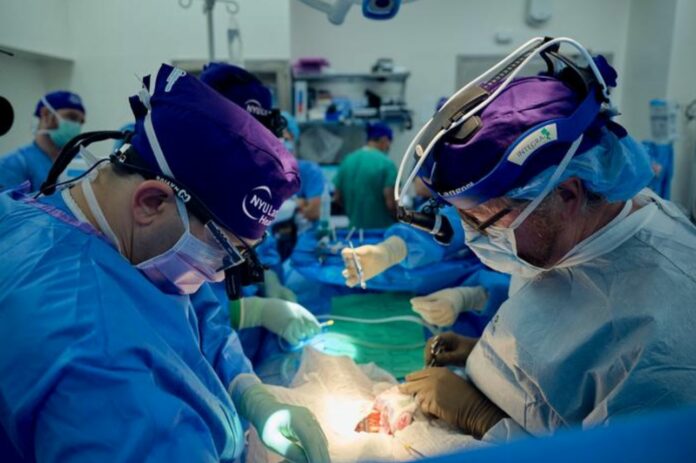A new study published today reveals how surgeons transplanted a genetically engineered pig kidney in a man and prevented rejection of the organ while preserving its function.
Can xenotransplantation really solve the organ shortage crisis in the U.S.?
In the U.S., the transplant waiting list exceeds 103,000 individuals, with close to 88,000 of them in anticipation of a kidney, as per the latest statistics from the federal Organ Procurement and Transplantation Network (OPTN).
In the year 2022, around 26,000 people underwent kidney transplants. Concurrently, the nation reports almost 808,000 individuals grappling with terminal kidney disease.
“There are simply not enough organs available for everyone who needs one,” commented Dr. Robert Montgomery, who led the team. “Too many people are dying because of the lack of available organs, and I strongly believe xenotransplantation is a viable way to change that.”
Notably, he led the world’s first transplantation of a genetically edited pig kidney into a human back on September 25, 2021, and subsequently led another same procedure on November 22, 2021. Moreover, during the summer of 2022, the Transplant Institute successfully executed two transplants using genetically modified pig hearts.
Surgeons at NYU Langone Health have achieved a groundbreaking milestone by transplanting a genetically edited pig kidney, which has now functioned seamlessly for 32 days in a human declared dead by neurologic criteria.
This breakthrough signifies the longest a genetically modified pig kidney has been operational in a human body, marking a pivotal stride towards a sustainable alternative organ supply for transplantation.
NYU Langone Surgeons Successfully Transplant Engineered Pig Kidney for Record 32 Days
On July 14, 2023, under the leadership of Dr. Robert Montgomery, a team at NYU Langone carried out their fifth xenotransplant. The pig kidney has successfully operated for 32 days, indicating its potential to replace human kidneys without rejection. Dr. Montgomery, a pioneer in the field, previously transplanted genetically modified pig kidneys in 2021 and two pig hearts in 2022.
A significant challenge in xenotransplants is the swift rejection of animal organs. The NYU team tackled this by modifying the pig’s genetics, eliminating the primary cause of hyperacute rejection. The team also implanted the pig’s thymus gland in the kidney to further prevent rejection, ensuring its continued functionality.
“This work demonstrates a pig kidney—with only one genetic modification and without experimental medications or devices—can replace the function of a human kidney for at least 32 days without being rejected,” remarked Dr. Montgomery.
How to prevent hyperacute rejection in xenotransplants?
One of the significant challenges in xenotransplants is warding off the instant rejection, often witnessed mere moments after an animal’s organ is integrated into the human bloodstream. By eliminating the gene associated with the alpha-gal biomolecule—known to trigger fast antibody-led rejection of pig organs in humans—the immediate rebuff was sidestepped in all five procedures conducted at NYU Langone. Moreover, by strategically placing the pig’s thymus gland beneath the kidney’s surface layer, they managed to counteract unexpected, delayed immune reactions. This combined approach has effectively ensured that the kidney remains functional without rejection.
In order to rely exclusively on the pig kidney’s functionality, both kidneys of the recipient were surgically excised. Subsequently, a pig kidney was introduced, which began to function, emitting urine right away without any immediate rejection signs. Throughout the examination period, specialized medical teams diligently oversaw the individual, conducting routine biopsies of the pig kidney. Blood tests displayed optimal creatinine levels, a marker of kidney health, and biopsies showed no signs of rejection throughout the study.
This particular procedure forms part of a broader research initiative sanctioned by NYU Langone’s dedicated ethics review board. It took place post deliberations with the New York State Department of Health. The invaluable study, touted to have life-saving potential in the coming years, was enabled by a 57-year-old gentleman’s family who chose to offer his body post a declared brain death, given that his organs weren’t apt for transplantation.
LiveOnNY, a commendable non-profit in the New York City vicinity specializing in organ and tissue donations, played an instrumental role. They ensured consistent communication, guidance, and collaboration during the donor family’s authorization journey.
The organs utilized in this groundbreaking procedure came from a GalSafe™ pig, a specially designed creature by Revivicor, Inc., affiliated with United Therapeutics Corporation. In the closing month of 2020, the GalSafe pig received the U.S. Food and Drug Administration (FDA) seal of approval, both as a potential medical solution for humans and as a dietary option for those diagnosed with alpha-gal syndrome – an allergic reaction to certain meats initiated by a tick bite.
Simplifying Kidney Xenotransplants Might Be the Key
Earlier experiments with genetically altered pig organ transplants often involved up to ten genetic tweaks. However, recent findings highlight that a pig kidney with just a single genetic alteration can efficiently function in humans for a minimum of 32 days without any rejection.
Dr. Montgomery noted, the findings suggest “at least in kidneys, just eliminating the gene that triggers a hyperacute rejection may be enough along with clinically approved immunosuppressive drugs to successfully manage the transplant in a human for optimal performance—potentially in the long-term.”
To ensure patient safety, the NYU Langone group adopted conventional transplant immunosuppression drugs and implemented rigorous checks for porcine cytomegalovirus (pCMV) in the donating pig. Current research points to the possibility of pCMV impacting organ function and even leading to organ failure.
Impressively, after 32 days post-transplant, no traces of pCMV were found. The team also closely monitored for the presence of porcine endogenous retrovirus (PERV) and six other relevant viruses.
The Road Ahead
The patient’s monitoring will extend for another month, with support from United Therapeutics. Insights from this additional period will further inform the next steps in xenotransplant research.
“We know this has the potential to save thousands of lives, but we want to ensure the utmost safety and care as we move forward,” concluded Dr. Montgomery.
Image Credit: Joe Carrotta for NYU Langone Health
